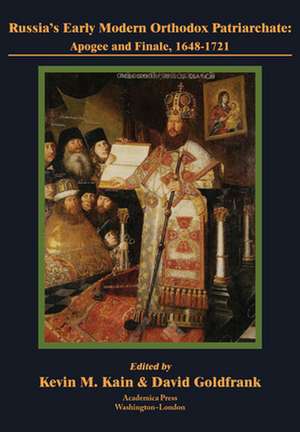Russia's Early Modern Orthodox Patriarchate
Autor David Goldfranken Limba Engleză Hardback – iul 2020
| Toate formatele și edițiile | Preț | Express |
|---|---|---|
| Hardback (2) | 777.97 lei 6-8 săpt. | |
| Academica Press – iul 2020 | 777.97 lei 6-8 săpt. | |
| Academica Press – iul 2020 | 778.12 lei 6-8 săpt. |
Preț: 778.12 lei
Preț vechi: 1010.55 lei
-23% Nou
Puncte Express: 1167
Preț estimativ în valută:
148.93€ • 153.48$ • 125.73£
148.93€ • 153.48$ • 125.73£
Carte tipărită la comandă
Livrare economică 01-15 martie
Preluare comenzi: 021 569.72.76
Specificații
ISBN-13: 9781680539417
ISBN-10: 1680539418
Pagini: 260
Dimensiuni: 152 x 229 x 18 mm
Greutate: 0.57 kg
Editura: Academica Press
ISBN-10: 1680539418
Pagini: 260
Dimensiuni: 152 x 229 x 18 mm
Greutate: 0.57 kg
Editura: Academica Press
Descriere
Patriarch Nikon was the most energetic, creative, influential, and obstinate of Russia's early religious leaders. This exceptional volume contextualizes Nikon's Patriarchate as part of the broader continuities in Russian history and serves as a bridge to the present, where Russia is forging new relationships between Church and power.
